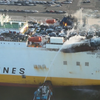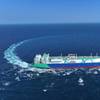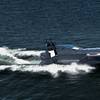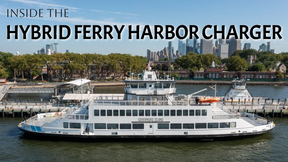Less than a fortnight after forces loyal to Khalifa Haftar swept into four of Libya's oil ports, tankers are loading, production has jumped, and momentum has shifted firmly in the divisive former general's favour.
For Haftar's opponents, and for Western powers, the move on the ports was alarming. Haftar and his backers in eastern Libya have been in a stand-off for months with a unity government in Tripoli, blocking any parliamentary vote to endorse it and challenging the U.N.-mediated deal to unify Libya.
How Haftar and his allies will use control of the country's major oil exports - whether to leverage political advantage under that U.N. deal, or to extend military control across Libya - is still uncertain. But risks to stability are clear.
"I think we have to regard [Haftar's] motives with a high degree of scepticism," said a senior Western diplomat. "I think there are significant risks to both the [unity government] and the whole political agreement if this is allowed to drift in the wrong direction."
For now, the West may be forced to accept Haftar's move. After initially condemning the attack on the ports and calling on Haftar's forces to withdraw, the United States and European powers joined other countries on Thursday to "welcome the recent transfer of the oil facilities in the oil crescent to the National Oil Corporation (NOC) as well as the plans to increase oil production and exports".
Some even see a chance for a breakthrough between loosely aligned pro- and anti-Haftar camps that have battled each other since 2014, setting up rival institutions in eastern and western Libya and deepening the turmoil that has plagued the country since late dictator Muammar Gaddafi was toppled in 2011.
After Haftar's forces swiftly handed operational control of the ports to the NOC, the NOC's early work to restore production has been only briefly disturbed by a counter attack that was repelled within the day.
NOC Chairman Mustafa Sanalla said he hoped the concession of control would lead to "a new phase of cooperation and coexistence" between factions that have shut down most of Libya's oil output as they competed for power.
Haftar himself, whose stature has gradually risen as his self-styled Libyan National Army (LNA) has waged a long, bloody campaign in eastern Libya against Islamists and other opponents, has softened his tone.
The move on the ports was aimed at "protecting national resources" and ending a blockade that was starving Libya of revenue and causing a financial crisis, he said in comments posted online by the LNA. Western powers can "rest assured that this operation is neither against reconciliation, nor does it have any political goals".
Two weeks before the ports were seized, a Haftar ally suspended his boycott of the unity government's leadership, or Presidential Council, proposing a joint military council as a way of breaking a deadlock over the future leadership of the armed forces.
The Council meanwhile is working to present a new list of ministers, as requested by Haftar's allies in the eastern parliament. The Council's leader, Prime Minister Fayez Seraj, has said he is ready to meet Haftar.
Analysts and diplomats also say Haftar's forces are thinly stretched, still struggling to secure parts of the eastern city of Benghazi where they have continued to suffer heavy losses. The seizure of the ports was largely achieved through tribal negotiations and timing, the operation launched on the eve of the Muslim holiday of Eid al-Adha.
General's Long History
But none of this has reassured Haftar's opponents, who see the one-time Gaddafi ally, freshly promoted by the parliament based in the east to the rank of marshal from general, as a new military autocrat in the making.
His history in Libyan politics worries critics. A one-time ally of Gaddafi, he fell out with the dictator when he was sent to lead a war in Chad, only to be captured and end up in exile in the United States. He spent decades living in Virginia.
Haftar returned to help in the uprising against Gaddafi, then reappeared again in 2014 on television in uniform to present what he said was a plan to save the country. Later, he launched an operation against Islamist militants and others in Benghazi.
He has gained support in the east, where he is seen by some as a saviour. But he is far from fully supported there. In the west, particularly the port of Misrata, many Libyans despise him as a remnant of the old regime and a would-be strongman.
Opponents now point to recent moves to extend control in the east by replacing mayors with military men and cracking down on dissent, and say they need to protect the revolution of 2011, if necessary with force.
After taking the oil ports, Haftar's forces advanced to within 150 km (95 miles) of Sirte, where rival brigades from Misrata that are aligned with the unity government are nearing the end of a campaign to capture the city from Islamic State.
Opponents fear Haftar allies in the west are laying the ground for a move on Tripoli.
On Wednesday the Misratan head of a State Council, an advisory chamber that was set up in Tripoli under the U.N. deal, issued a statement condemning Haftar's oil port move and claiming to assume legislative power from the parliament in the east.
The statement appealed to "all honourable people of Libya and its revolutionaries to resist the military coup" by Haftar. It called on the unity government's defence minister, a Haftar rival, "to secure areas under its control, especially the capital, Tripoli, and respond firmly to any attempt to undermine security and stability".
But with Misrata's own factions divided and the unity government still struggling to impose its authority on armed groups that control the capital, there may be little scope for them to push back.
"I don't think the Presidential Council has many alternatives or much margin for manoeuvre," said a North African diplomatic source.
"It seems to me that they are in a position where they have to move towards a negotiated, peaceful solution that brings an answer for a population that unfortunately has lost all its patience If not, a counter action could just serve to make the opposing party even more popular."
(By Aidan Lewis, Editing by Patrick Markey and Peter Graff)












